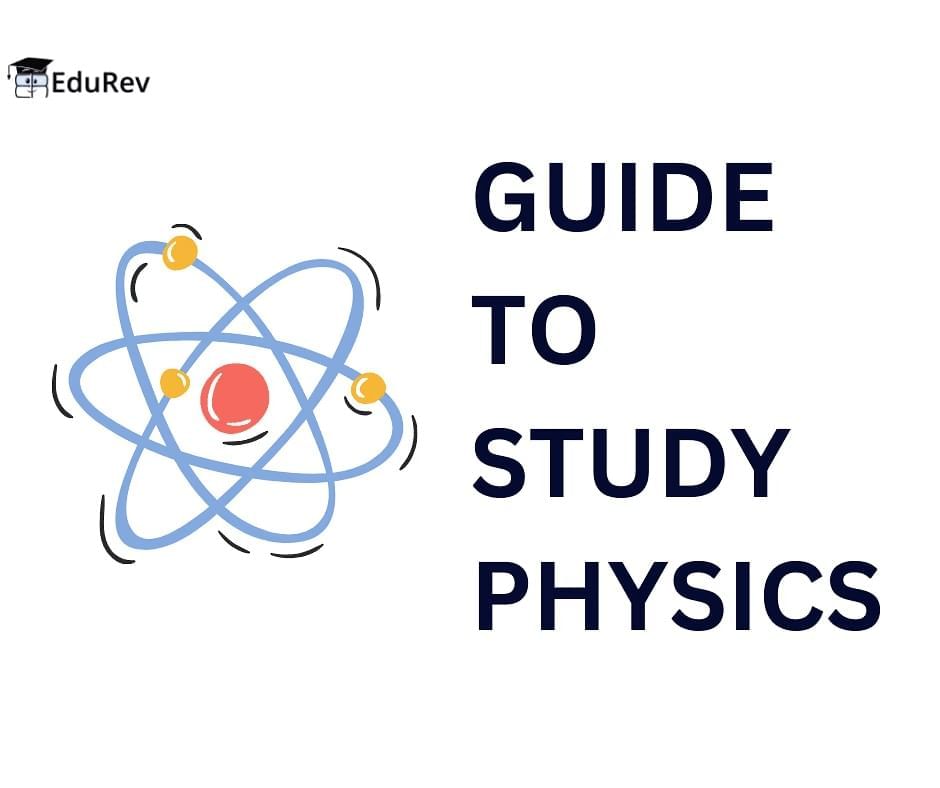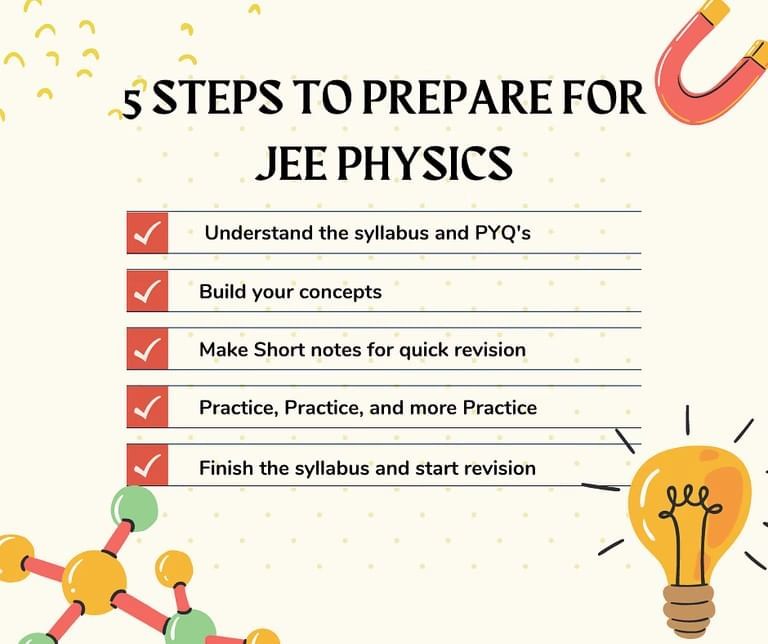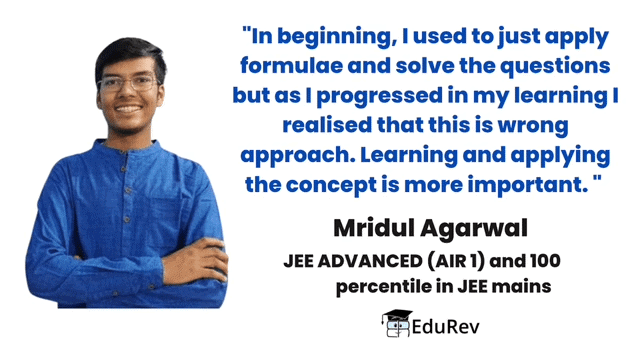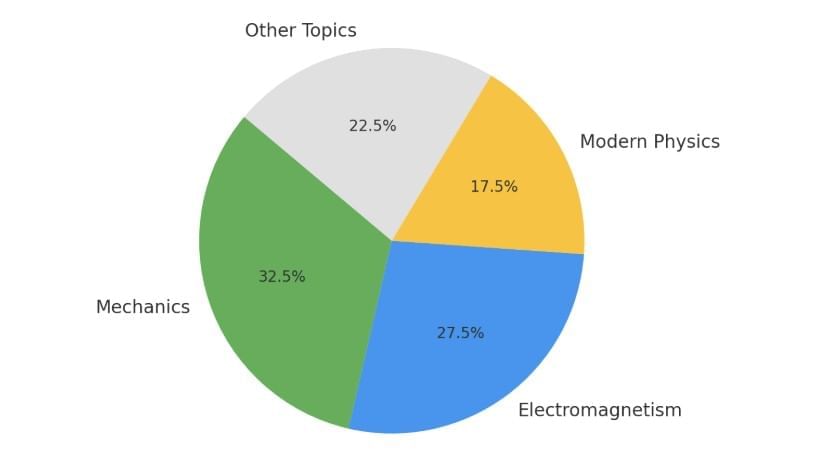How to Prepare for JEE Physics with EduRev? | Physics for JEE Main & Advanced PDF Download

Guide to help you prepare for JEE Physics
Physics is often considered one of the toughest subjects, yet it remains one of the most interesting. What makes Physics engaging for students is the pattern of questions asked in the JEE and the practical nature of the syllabus. Since the concepts are closely linked to real-life experiences, students find them easier to understand.
JEE Physics questions are largely application-based — they are often straightforward to solve but conceptually challenging to interpret. To tackle such problems effectively, students need a solid strategy, and this document aims to provide exactly that.
Why & how this guide was made:
EduRev realized that many students face challenges in preparing for Physics due to overwhelming content and lack of direction. This guide ensures students can prepare with minimal time, effort, and cost by guiding them through structured learning, practice, and revision.
The guide is crafted by EduRev experts with interviews with their following students:
Mridul Agarwal (AIR 1 in JEE advanced and 100 percentile in JEE mains ), Amaiya Singhal (100 percentile in JEE mains), Siddhant Mukherjee (100 percentile in JEE mains) and Anmol Arichwal (100 percentile in JEE mains).

Step 1: Understand the syllabus and previous year’s questions.
- Exam Pattern: The JEE Main Physics section typically consists of two parts: Section A (20 questions, all mandatory) and Section B (10 questions, attempt any 5). Note: Verify the latest exam pattern, as it may change annually.
- Know the Syllabus: Familiarize yourself with the syllabus, question types, and marking scheme. Understand topic weightages (provided at the end of this guide) to prioritize high-yield chapters.
- Analyze Past Papers: Review previous years’ JEE question papers to identify high-weightage topics, difficulty levels, and question patterns. This helps you focus on key areas and understand the exam’s expectations.

Step 2: Build your concepts
Step 2.1 Tips before you start working on the concepts
Create a Study Schedule: Plan your study time, covering topics by difficulty, study hours, and revision deadlines. Follow it consistently, as last-minute cramming is ineffective for JEE’s vast syllabus.
- Focus on Understanding: Dive deep into concepts rather than memorizing. Ask “why” and “how” to grasp the logic behind formulas and principles.
- Make Notes: Jot down key points while studying. Use EduRev’s revision notes or create your own for quick reference.
- Avoid Calculators: Practice mental math and manual calculations to improve speed and accuracy, as calculators are not allowed in JEE.
- Build Problem-Solving Skills: Attempt questions independently before checking solutions to enhance critical thinking.
- Practice Regularly: Consistent practice strengthens conceptual understanding and boosts speed.
Step 2.2. How to study the concepts of physics.
Start with HC Verma for a clear conceptual foundation, then use NCERT for detailed explanations and applications. Pay attention to NCERT’s summary points and “Points to Ponder.”
- Watch EduRev’s video lessons or refer to the Physics Class 11 and 12 courses for concise notes, videos, and tests.
- Solve NCERT Exemplar, NCERT Exercise, and HC Verma questions to reinforce concepts. Progress to DC Pandey for varied question types and Irodov for advanced problems (selectively, as some questions are beyond JEE scope).
Step 3: Make Short notes for quick revision
Formula Sheets: After understanding derivations, memorize formulas and maintain a formula book for quick recall during numericals. EduRev offers chapter-wise formula sheets for reference.
- Mind Maps and Tables: Summarize NCERT concepts in mind maps or tabular notes for efficient revision. List all formulas on a single sheet for regular review.
- Margin Notes: Write key points, doubts, or shortcuts in the margins of NCERT or HC Verma books to streamline revision.
- Flashcards: Create flashcards for tricky formulas or concepts. EduRev’s flashcard courses can supplement this.
- Track Key Content: Maintain a list of derivations, formulas, and experiments, and review it daily.
Step 4: Practice, Practice, and more Practice
Step 4.1. Practise numericals on daily basis.
- Physics numericals are challenging but essential. Practice daily to overcome fear and build confidence.
- Start with NCERT Exemplar and Exercise questions, then solve HC Verma (solved examples, MCQs 1 and 2). Progress to DC Pandey for diverse problems and Irodov for advanced topics (selectively).
- Solve MCQs regularly to align with JEE’s format.
Step 4.2. Take up Mock Tests & PYQs
Assess Preparation: Take subject-wise mock tests on EduRev to gauge your progress, even if only one topic is complete.
- Simulate Exam Conditions: Attempt full-length mock tests daily in the last six months to build stamina and time management skills.
- Learn Time Management: Practice solving numericals within 2 minutes to meet JEE’s time constraints.
- Analyze Performance: Review mock test results to identify weak areas. EduRev’s All India Rank (AIR) feature helps benchmark your progress.
- Revisit Tricky Questions: Mark and revisit challenging questions to improve.
- Solve PYQs: Attempt previous years’ papers to understand question patterns and frequently tested topics.
Tip for Numericals: Apply conceptual knowledge, not just memorized formulas, to tackle complex problems.
Step 5: Finish the syllabus and start revision 6 months before the exam
- Complete the Syllabus Early: Finish the syllabus six months before the exam to allow ample revision time.
- Focus on Key Questions: Revisit starred or difficult questions marked during practice. EduRev’s “star” feature helps track these.
- Use One Source: Revise from a single set of notes or resources to avoid confusion. Multiple readings of one source are more effective than switching between sources.
- Clear Doubts: Address all doubts during revision to ensure clarity.
- Leverage Tests: Revise through topic-wise, subject-wise, and full-length mock tests on EduRev.
- Review Formulas: Regularly revisit your formula book and self-made notes for quick recall.
Step 6: Avoid silly mistakes on D-day
Avoid simple errors to get a good score. Follow the following checklist to avoid making silly mistakes.
- Read Carefully: Pay close attention to question details and figures to avoid errors.
- Choose Wisely in Section B: Select questions requiring fewer calculations to minimize mistakes.
- Prioritize Easy Questions: Spend the first few minutes identifying the 40–50% of questions that are straightforward. Solve these first to secure marks.
- Use Rough Pages Effectively: Avoid cluttered rough work; use multiple pages if needed.
- Balance Speed and Accuracy: Aim to solve questions within 2 minutes for the first 90 minutes to cover the cutoff. Focus on accuracy for the remaining time to maximize your score (aim for 90+ in Physics).
- Double-Check: Review calculations to catch simple errors, as negative marking can impact your rank.
How to Use EduRev Effectively?
1. Start with Conceptual Clarity
Begin your preparation by watching EduRev’s video lessons on each topic. These videos break down complicated concepts like Laws of Motion, Thermodynamics, Electrostatics, etc., into smaller, manageable chunks. The videos also provide visual explanations that can help you understand abstract concepts more easily.
Tip: Focus on the fundamentals first. Don’t rush through topics—take your time to understand each concept thoroughly before moving on.
2. Use Notes for Quick Revision
After watching the video lessons, download the topic-wise notes available on EduRev. The notes are highly concise, covering all the important points, derivations, and formulas needed for JEE Physics. Keep these notes for revision, especially closer to the exam date.
Tip: Write down key formulas and derivations separately in a formula sheet. This will help you with last-minute revision and boost your confidence.
3. Practice Regularly with MCQs & Practice Questions
Once you have understood a topic, the next step is to apply the knowledge by solving practice questions. EduRev provides a wide range of MCQs, as well as numerical-based questions, from various topics of JEE Physics.
Tip: Focus on varied difficulty levels. Start with easier problems to build confidence, and then gradually move on to more complex problems.
4. Solve Previous Year Papers
EduRev gives you access to JEE Main and Advanced previous year question papers, which are invaluable for understanding exam trends and important topics. These papers will give you insight into the most frequently asked questions and the format of questions.
Tip: Solve these papers under exam conditions (time yourself) to build exam-taking skills and enhance your time management.
5. Take Regular Mock Tests
Mock tests are an excellent way to simulate the actual JEE exam experience. EduRev offers Physics mock tests designed specifically for JEE. These tests are timed and help you practice under realistic exam conditions.
Tip: Take mock tests at regular intervals to track your progress. After each test, analyze your performance and focus on areas where you scored poorly.
6. Review Your Mistakes
After solving practice questions and taking mock tests, review the mistakes you made and learn from them. EduRev provides detailed solutions and explanations for each question, which will help you understand where you went wrong.
JEE Physics Syllabus and Topic Weightage
The Physics section heavily emphasizes Mechanics (30–35%), Electromagnetism (25–30%), and Modern Physics (15–20%), which together account for over 75% of the section. Prioritize these areas while ensuring coverage of all topics.

(i) Class 11
(ii) Class 12
Note: Refer to the official JEE syllabus for the latest updates, as weightages and topics may vary slightly each year.
Good luck with your preparation, and keep utilizing EduRev’s resources to their full potential!
|
268 videos|740 docs|171 tests
|
FAQs on How to Prepare for JEE Physics with EduRev? - Physics for JEE Main & Advanced
| 1. What are the key features of EduRev that can help me in JEE Physics preparation? |  |
| 2. How can I effectively use EduRev for JEE Physics preparation? |  |
| 3. What resources does EduRev provide specifically for JEE Physics preparation? |  |
| 4. How does EduRev support doubt clearing for JEE Physics students? |  |
| 5. What is the best strategy for preparing for JEE Physics using EduRev? |  |

















